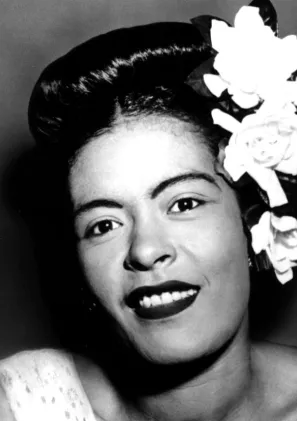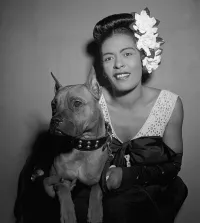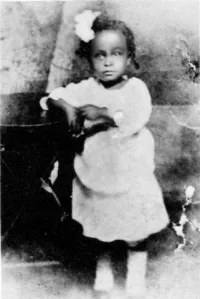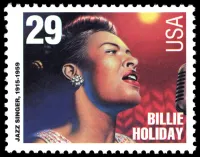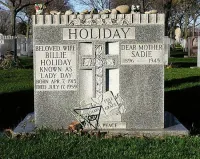Biography
1915 - 1959
“If I'm going to sing like someone else, then I don't need to sing at all.”
– Billie Holiday
Born in 1915 in Philadelphia, and growing up in Baltimore, Eleanora Fagan (a.k.a. Billie Holiday) endured a brutally difficult childhood that saw her committed to an abusive Catholic reform school at age 9. A drop-out by age 11, Eleanora left Baltimore in 1929 to pursue a singing career as part of the Harlem Renaissance in New York City.. “Lady Day” performed with both Count Basie and Artie Shaw – the first time a Black woman headlined an all-white orchestra. Her popular recording of Summertime from “Porgy and Bess” in 1936 promised a meteoric career awaited. But racial discrimination – which required that she use kitchen entrances and service elevators while the white musicians who backed her strode through the lobby – left her disillusioned. It was at the popular integrated Greenwich Village club, Café Society, that Holiday would first perform the song that would make her a legend: Strange Fruit. Based on a poem inspired by a photograph of two black men who had been lynched, Holiday wept in front of a stunned audience the first time she performed the haunting ballad - and every time thereafter. When Columbia refused to record it, Commodore Records stepped in. Holiday’s iconic recording went on to sell 1,000,000 copies as a Top-20 hit in 1939. Commercial success continued with the release of God Bless the Child. Throughout her 30-year career, Billie wowed audiences with her unique vocal delivery... always with a gardenia in her hair. Her best-selling 1956 autobiography, Lady Sings the Blues, was made into a critically-acclaimed 1972 motion picture that earned its star – Diana Ross – an Academy Award nomination. Like the book, the film made no attempt to gloss over Holiday’s addictions to heroin and alcohol, which led to her arrest and brief incarceration in 1947. After her release in 1948, Holiday received standing ovations for a sold-out comeback performance at Carnegie Hall. But decades of substance abuse had taken its toll. Billie Holiday – who was an out bisexual her entire adult life – died in 1959. She was posthumously inducted into the Grammy Hall of Fame in 1973, ASCAP Jazz Wall of Fame in 1997, Rock and Roll Hall of Fame in 2000, and the Ertegun Jazz Hall of Fame in 2004. Strange Fruit – considered by scholars to be the first protest song of the Civil Rights Movement – endures as the pinnacle of her legacy.
1915 - 1959
“If I'm going to sing like someone else, then I don't need to sing at all.”
– Billie Holiday
Born in 1915 in Philadelphia, and growing up in Baltimore, Eleanora Fagan (a.k.a. Billie Holiday) endured a brutally difficult childhood that saw her committed to an abusive Catholic reform school at age 9. A drop-out by age 11, Eleanora left Baltimore in 1929 to pursue a singing career as part of the Harlem Renaissance in New York City.. “Lady Day” performed with both Count Basie and Artie Shaw – the first time a Black woman headlined an all-white orchestra. Her popular recording of Summertime from “Porgy and Bess” in 1936 promised a meteoric career awaited. But racial discrimination – which required that she use kitchen entrances and service elevators while the white musicians who backed her strode through the lobby – left her disillusioned. It was at the popular integrated Greenwich Village club, Café Society, that Holiday would first perform the song that would make her a legend: Strange Fruit. Based on a poem inspired by a photograph of two black men who had been lynched, Holiday wept in front of a stunned audience the first time she performed the haunting ballad - and every time thereafter. When Columbia refused to record it, Commodore Records stepped in. Holiday’s iconic recording went on to sell 1,000,000 copies as a Top-20 hit in 1939. Commercial success continued with the release of God Bless the Child. Throughout her 30-year career, Billie wowed audiences with her unique vocal delivery... always with a gardenia in her hair. Her best-selling 1956 autobiography, Lady Sings the Blues, was made into a critically-acclaimed 1972 motion picture that earned its star – Diana Ross – an Academy Award nomination. Like the book, the film made no attempt to gloss over Holiday’s addictions to heroin and alcohol, which led to her arrest and brief incarceration in 1947. After her release in 1948, Holiday received standing ovations for a sold-out comeback performance at Carnegie Hall. But decades of substance abuse had taken its toll. Billie Holiday – who was an out bisexual her entire adult life – died in 1959. She was posthumously inducted into the Grammy Hall of Fame in 1973, ASCAP Jazz Wall of Fame in 1997, Rock and Roll Hall of Fame in 2000, and the Ertegun Jazz Hall of Fame in 2004. Strange Fruit – considered by scholars to be the first protest song of the Civil Rights Movement – endures as the pinnacle of her legacy.
Lesson Plan
Please login or register for an account to view this lesson plan.
Demography
Demography
Gender Female
Sexual Orientation Bisexual
Gender Identity Cisgender
Ethnicity African American
Faith Construct Catholic
Nations Affiliated United States
Era/Epoch Great Depression (1929-1939) Harlem Renaissance (1919-1929) Interwar Period (1918-1939) Jazz Age (1910-1940)
Field(s) of Contribution
Author
Entertainer
Film
Music
Social Justice
Social Sciences
Television
US History
Commemorations & Honors
Posthumous Grammy Hall of Fame Inductee (1973)
U.S. Postal Service Commemorative Stamp (1994)
Posthumous ASCAP Jazz Wall of Fame Inductee (1997)
Posthumous Rock and Roll Hall of Fame Inductee (2000)
Posthumous Ertegun Jazz Hall of Fame Inductee (2004)
Grammy Award Best Historical Album (1980, 1992, 1994, 2002)
Demography
Gender Female
Sexual Orientation Bisexual
Gender Identity Cisgender
Ethnicity African American
Faith Construct Catholic
Nations Affiliated United States
Era/Epoch Great Depression (1929-1939) Harlem Renaissance (1919-1929) Interwar Period (1918-1939) Jazz Age (1910-1940)
Field(s) of Contribution
Author
Entertainer
Film
Music
Social Justice
Social Sciences
Television
US History
Commemorations & Honors
Posthumous Grammy Hall of Fame Inductee (1973)
U.S. Postal Service Commemorative Stamp (1994)
Posthumous ASCAP Jazz Wall of Fame Inductee (1997)
Posthumous Rock and Roll Hall of Fame Inductee (2000)
Posthumous Ertegun Jazz Hall of Fame Inductee (2004)
Grammy Award Best Historical Album (1980, 1992, 1994, 2002)
Resources
Resources
Alexander, Paul, Bitter Crop: The Heartache and Triumph of Billie Holiday's Last Year, New York: Knopf, 2024.
Griffin, Farah Jasmine, If You Can't Be Free, Be a Mystery: In Search of Billie Holiday, London: OneWorld Publications, 2002.
Gilbert, Ebony, Billie Holiday: The Graphic Novel: Women in Jazz, Los Angeles: Fantoons, 2021.
Griffin, Farah Jasmine, Read Until You Understand: The Profound Wisdom of Black Life and Literature, New York: W. W. Norton & Company, 2021.
Griffin, Farah Jasmine, "Who Set You Flowin'?": The African American Migration Narrative, Oxford: Oxford University Press, 1996.
Holiday, Billie and Duffy, William, Lady Sings the Blues, New York: Doubleday, 1956.
O'Meally, Robert G., Lady Day: The Many Faces of Billie Holiday, U.S.: Arcade Pub, 1991.
O'Meally, Robert G., Romare Bearden: A Black Odyssey, New York: DC Moore Gallery, 2008.
O'Meally, Robert G., The Craft of Ralph Ellison, Cambridge: Harvard University Press, 1980.
https://www.britannica.com/biography/Billie-Holiday
https://nmaahc.si.edu/billie-holiday
https://bi.org/en/famous/billie-holiday
Resources
Alexander, Paul, Bitter Crop: The Heartache and Triumph of Billie Holiday's Last Year, New York: Knopf, 2024.
Griffin, Farah Jasmine, If You Can't Be Free, Be a Mystery: In Search of Billie Holiday, London: OneWorld Publications, 2002.
Gilbert, Ebony, Billie Holiday: The Graphic Novel: Women in Jazz, Los Angeles: Fantoons, 2021.
Griffin, Farah Jasmine, Read Until You Understand: The Profound Wisdom of Black Life and Literature, New York: W. W. Norton & Company, 2021.
Griffin, Farah Jasmine, "Who Set You Flowin'?": The African American Migration Narrative, Oxford: Oxford University Press, 1996.
Holiday, Billie and Duffy, William, Lady Sings the Blues, New York: Doubleday, 1956.
O'Meally, Robert G., Lady Day: The Many Faces of Billie Holiday, U.S.: Arcade Pub, 1991.
O'Meally, Robert G., Romare Bearden: A Black Odyssey, New York: DC Moore Gallery, 2008.
O'Meally, Robert G., The Craft of Ralph Ellison, Cambridge: Harvard University Press, 1980.
https://www.britannica.com/biography/Billie-Holiday
https://nmaahc.si.edu/billie-holiday
https://bi.org/en/famous/billie-holiday
